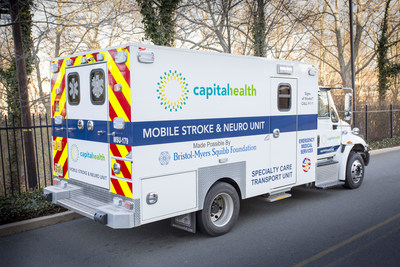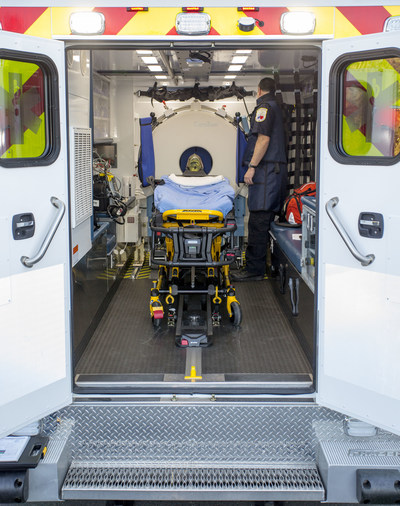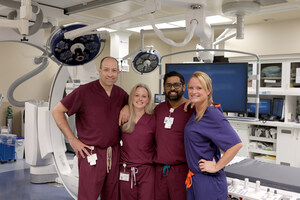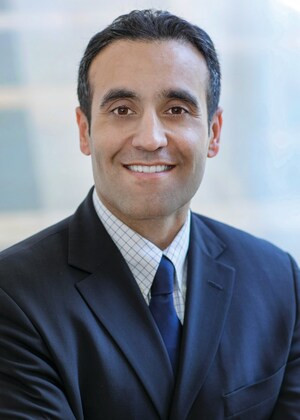Capital Health Launches First Mobile Stroke Unit in New Jersey/Pennsylvania and Delaware Valley, and Only Second on the East Coast, with Funding from $2 Million Grant from Bristol-Myers Squibb Foundation
Mobile Stroke Unit to Enhance the Nation's Most Advanced Stroke Program and Provide Time Critical Stroke Care at Patient's Home
TRENTON, N.J., Jan. 26, 2017 /PRNewswire-USNewswire/ -- Capital Health today announced the launch of an innovative new Mobile Stroke Unit (MSU) designed to bring time-critical stroke care to patients at their home, or wherever the MSU is dispatched to assess them. It is the first unit of its kind in New Jersey, Pennsylvania or the Delaware Valley to go live and only the second on the east coast. The Capital Health MSU is one of only seven in the United States to be in service and will go live January 30.
"The Mobile Stroke Unit is the most advanced approach to stroke care in the United States. Initially trialed in Germany, the approach has been shown to be effective at delivering time critical stroke treatment to patients safely and quickly," said Dr. Michael F. Stiefel, director of the Capital Institute for Neurosciences and the Stroke and Cerebrovascular Center at Capital Health. "Stroke is the fifth leading cause of death in the U.S. and a leading cause of adult disability. When you're dealing with a disease where every minute matters, decreasing time to diagnosis and treatment is critical for a person's outcome. Capital Health has consistently been at the forefront of advancing stroke care and neurosciences not only in the region but nationally as well."
The MSU includes a CT scanner, point-of-care laboratory testing, and a team comprised of a critical care nurse, paramedic and CT technologist. Funding for the unit is made possible through a $2 million grant Capital Health received from the Bristol-Myers Squibb Foundation to acquire the Mobile Stroke Unit and help maintain the hospital's emergency vehicle fleet.
"Capital Health has a long history of providing high level care to the region's most vulnerable populations. Stroke is a high acuity, time sensitive illness, and we are excited to help Capital Health bring this innovative approach to the Mercer County area," said John Damonti, president of the Bristol-Myers Squibb Foundation.
"Capital Health's commitment to the residents of our community includes always looking for ways to advance the care available to them," said Al Maghazehe, president and CEO of Capital Health. "Dr. Stiefel's leadership of our neurosciences program and Bristol-Myers Squibb Foundation's significant support are allowing us to provide care only available in a few places around the country. I want to thank Bristol-Myers Squibb, who also very generously provided leadership support for the Bristol-Myers Squibb Trauma Center at our Trenton location, for their continued confidence in our mission."
The new unit will be co-dispatched with basic and advanced life support services when a 911 call is received for symptoms that suggest a patient is having a stroke. For its launch, it will operate 7 days a week, from 7 am to 11 pm, which is when more than 90 percent of stroke dispatches occur. The MSU will be phased into the entire Mercer County area.
Once on scene, the unit and its specialized team will conduct critical assessments, perform a CT scan, and work with stroke specialists, neuroradiologists, and emergency room physicians at Capital Health to diagnose and treat patients having an acute ischemic stroke.
Images from the unit's CT scanner are wirelessly transmitted to Capital Health where a neuroradiologist will evaluate them for signs of a stroke and the type of stroke; ischemic (caused by a blood clot) or hemorrhagic (caused by a ruptured blood vessel). At the same time, a neurologist or cerebrovascular/stroke neurosurgeon will be assessing the patient with the most advanced video and telemedicine systems.
If it is found that the patient is experiencing an acute ischemic stroke – which account for about 87 percent of all strokes – the on-board medical team can initiate intravenous (IV) tissue plasminogen activator (tPA) to help break up the clot. tPA is the recommended treatment by the American Heart and Stroke Association for acute ischemic stroke.
Patients are then transported to the hospital for additional care. Capital Health is working with all of the other area hospitals through a consortium to collaborate on the MSU.
Capital Health Regional Medical Center in Trenton is the only Comprehensive Stroke Center in the region certified by The Joint Commission, one of only six hospitals in New Jersey. The center, part of Capital Health's Capital Institute for Neurosciences, is available for patients who require the most advanced treatments for neurovascular and stroke care including neuroendovascular, neurosurgical and stroke services. The Institute includes New Jersey's largest and most advanced Neuro Intensive Care Unit. In addition to providing high level, tertiary level clinical care, the Institute has a strong focus on research and the Neurovascular Research Center houses the nation's only Neuroendovascular Simulator for teaching, surgical preparation, and device testing.
About Capital Health
Capital Health is the Central New Jersey/Lower Bucks County region's leader in providing progressive, quality patient care with significant investments in physicians, nurses and staff, as well as advanced technology. Comprised of two hospitals (Capital Health Regional Medical Center in Trenton and Capital Health Medical Center – Hopewell), a Hamilton outpatient facility, and various primary and specialty care practices across the region, Capital Health is a dynamic healthcare resource accredited by The Joint Commission.
A three-time Magnet-designated health system for nursing excellence, Capital Health serves as a Level II regional trauma center, regional perinatal center (including a Level III NICU), and emergency mental health screening center. Capital Health also offers the region's first and most experienced Pediatric Emergency Department and most recently, New Jersey's first Autism-Friendly Pediatric Emergency Department. Capital Health also provides innovative programs such as the Capital Institute for Neurosciences; nationally accredited Center for Comprehensive Breast Care; Center for Digestive Health; Marjorie G. Ernest Joint Replacement Center of Excellence; award-winning Center for Oncology; and the Heart & Vascular Institute, which includes the region's first accredited Chest Pain Center. For more information, visit capitalhealth.org.
About the Bristol-Myers Squibb Foundation
The Bristol-Myers Squibb Foundation promotes health equity and seeks to improve the health outcomes of populations disproportionately affected by serious diseases by strengthening health care worker capacity, integrating medical care and community-based supportive services, and mobilizing communities in the fight against disease.
The Foundation engages partners to develop, execute, evaluate and promote innovative programs to help patients with lung cancer in the United States; HIV and comorbid diseases such as cervical and breast cancers, tuberculosis and mental health disorders in sub-Saharan Africa; hepatitis B and C in China and India; veterans' mental health and well-being in the U.S.; and type 2 diabetes in the U.S., China and India. The Foundation also is working to build cancer nursing capacity in Central and Eastern Europe; and to expand access to specialty care for vulnerable populations with lung cancer, skin cancer, HIV, or cardiovascular disease in the U.S.
SOURCE Capital Health
Related Links
WANT YOUR COMPANY'S NEWS FEATURED ON PRNEWSWIRE.COM?
Newsrooms &
Influencers
Digital Media
Outlets
Journalists
Opted In








Share this article